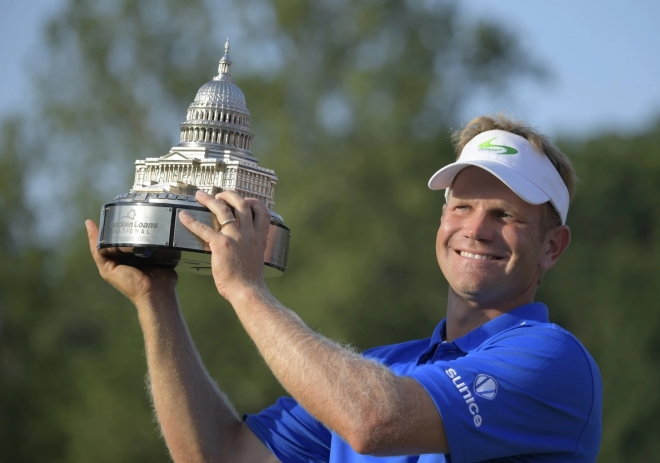LIBERTY CORNER, N.J. – In recognition of outstanding contributions to the game of golf, the United States Golf Association (USGA) today announced its annual Service Awards winners. The individuals will be recognized on Saturday, Feb. 3during a gala dinner at the USGA Annual Meeting in Miami, Fla.
This year’s USGA Service Awards celebrate the leadership, dedication and exemplary efforts of 26 individuals who have devoted their time and talents to serve the game.
“These extraordinary individuals are committed to leading with impact in their communities,” said Mike Davis, USGA CEO/Executive Director. “The USGA is proud to recognize them for their achievements and contributions to the game.”

Award winners include the following:
Gilbert “Gib” Palmer, Joe Dey Award
Presented annually since 1996, the Joe Dey Award recognizes an individual’s meritorious service to the game as a volunteer. The award is named for the late Joseph C. Dey Jr., who served as USGA executive director from 1934-1969 before becoming the first commissioner of the PGA Tour.
This year’s honoree, Gib Palmer, of Midlothian, Va., has served on the USGA’s Junior Championship Committee since 1996. During that time, he has served as a Rules official at nearly 20 U.S. Junior Amateur Championships while also volunteering at numerous other USGA championships. Palmer’s father gave him his first set of golf clubs, and he has been invested in the game since that moment. He also serves as an instrumental leader of the Virginia State Golf Association and the Virginia Golf Hall of Fame – an organization he helped establish.
“I had the pleasure of meeting Joe Dey many years ago and there is no one who better represented integrity, honesty and respect for the game,” said Palmer. “To be associated with his reputation is a tremendous honor and I’m incredibly thankful for this recognition.”
Dr. Lane Demas, Herbert Warren Wind Book Award
Established in 1987, the Herbert Warren Wind Book Award recognizes and honors outstanding contributions to golf literature while seeking to broaden the public’s interest in, and knowledge of, the game of golf. Wind, who died in 2005, was a renowned writer for The New Yorker and Sports Illustrated. He is the only writer to win the Bob Jones Award, the USGA’s highest honor.
Game of Privilege: An African American History of Golf, authored by this year’s recipient, Dr. Lane Demas, is a groundbreaking exploration of the role of race, class and access to the game of golf. Dr. Demas details the history of black golfers during the age of segregation, the legal battle to integrate public golf courses, and the little-known history of the United Golfers Association, an all-black golf tour that operated from 1925 to 1975.
“I’m proud of the fact that this book provides a narrative and historical content that’s accessible to everyone, especially the everyday golf fan,” said Dr. Demas. “It’s very humbling to receive this prestigious award and be recognized by a premier organization such as the USGA.”
Tim Hiers, Green Section Award
Presented annually since 1961, the USGA Green Section Award recognizes an individual’s distinguished service to the game of golf through his or her work with turfgrass, including research, maintenance and other areas that positively impact the landscape upon which golf is played.
The 2018 recipient, Tim Hiers, has been a golf course superintendent since 1976 and currently serves as the director of agronomy at The Club at Mediterra in Naples, Fla. Hiers stands at the forefront of golf’s environmental opportunities and challenges, while also driving advances in golf course management. An avid and articulate educator, he frequently hosts visitors ranging from school field trips to scientists and government officials.
“I learned to play golf on a cow pasture and I’ve been hooked on the game ever since,” said Hiers. “In this business, you can never learn enough. There’s always a challenge, and that’s what I love about being a superintendent. It’s a privilege to be recognized for just doing what you love every day.”
Isaac B. Grainger Awards
Established in 1995 as part of the USGA’s Centennial Celebration, the Isaac B. Grainger Award recognizes volunteers who have provided 25 years of service to the Association. Grainger served as USGA president from 1954-1955 and led the USGA effort to develop the first unified code of the Rules of Golf with The R&A in 1951.
Honorees include:
Craig Ammerman, of Tequesta, Fla.; Lee Coble, of Richmond, Va.; Richard Coon, of Amarillo, Texas; Kirke Doreweiler, of Scottsdale, Ariz.; Sheri Erskine, of San Ramon, Calif.; Sarah M. Haas, of Carterville, Ill.; John A. Hendry, of Lafayette, La.; Fay Ann Kikta, of Titusville, Fla.; Jeffrey S. Kuhn, of Houston, Texas; James M. Litvack, of Princeton, N.J.; Robert Markionni, of Lemont, Ill.; Martha Jett McAlister, of Hot Springs Village, Ark.; Mary Bea Porter-King, of Lihue, Hawaii; John T. Reis, of Paradise Valley, Ariz.; William K. Smith, of Baltimore, Md.; Rick Soskin, of Minnetonka, Minn.; Stephen L. Stine, of Sheridan, Wyo.; Judith L. Stine, of Sheridan, Wyo.; Mary Swingle, of Anthem, Ariz.; Sally Tomlinson, of Walnut Creek, Calif.; J. Daniel Walsh, of Stony Brook, N.Y.; Henri Wolbrette III, of Metairie, La.; and John S. Zoller, of Portland, Ore.
For more information, please visit http://www.usga.org.















You must be logged in to post a comment.